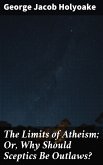In "Superstition Unveiled," Charles Southwell embarks on a critical examination of the cultural phenomena surrounding superstition during the 19th century. Utilizing a blend of sharp wit and empirical reasoning, Southwell dissects various superstitious beliefs, exploring their historical roots while advocating for rational thought and a scientific perspective. His literary style is marked by a polemical tone, laced with sarcasm and humor, making complex ideas accessible to a wide audience. Set against the backdrop of an era grappling with Enlightenment ideals, this work serves as both a critique and a call to intellectual awakening. Charles Southwell, an English freethinker and reformist, was profoundly shaped by the socio-political currents of his time, particularly the rise of rationalism and the questioning of traditional beliefs. His personal experiences with dogmatic institutions fostered a deep commitment to challenging established norms. Southwell's background in journalism also provided him with the tools to engage a broader readership, positioning him as a significant voice in the fight against blind adherence to superstition and dogma. "Superstition Unveiled" is an essential read for those who seek to understand the interplay between reason and belief in contemporary society. It appeals not only to scholars of philosophy and religion but also to any reader interested in the foundations of rational thought in our modern world. Southwell'Äôs incisive critique encourages us to question our own beliefs and confront the superstitions that may still pervade our lives.
Dieser Download kann aus rechtlichen Gründen nur mit Rechnungsadresse in A, B, BG, CY, CZ, D, DK, EW, E, FIN, F, GR, H, IRL, I, LT, L, LR, M, NL, PL, P, R, S, SLO, SK ausgeliefert werden.









